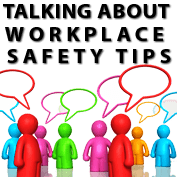 Raising a workplace safety concern with your boss can sometimes seem like a daunting prospect. Not doing so, however, can mean a dangerous incident goes unresolved, potentially injuring you or your co-workers. It could be something like a machine that is missing protective guards, dangerous movement of plant, poor housekeeping presenting trip hazards or speaking up if you see someone being bullied. Alternatively you might feel your training for a particular task was inadequate or you need more help to do a job safely. Whatever the issue, it is important to remember everyone has a right to work in a fair, just and safe workplace. Employers are obligated (as far as is reasonably practicable) to provide such an environment. Read more for tips on how to talk about safety.
Raising a workplace safety concern with your boss can sometimes seem like a daunting prospect. Not doing so, however, can mean a dangerous incident goes unresolved, potentially injuring you or your co-workers. It could be something like a machine that is missing protective guards, dangerous movement of plant, poor housekeeping presenting trip hazards or speaking up if you see someone being bullied. Alternatively you might feel your training for a particular task was inadequate or you need more help to do a job safely. Whatever the issue, it is important to remember everyone has a right to work in a fair, just and safe workplace. Employers are obligated (as far as is reasonably practicable) to provide such an environment. Read more for tips on how to talk about safety.
Tips For Talking About Safety – In most workplaces, your first port of call would be flagging a safety concern with a supervisor, health and safety or union representative. You might feel intimidated or awkward, but the few minutes it takes to talk – and hopefully find a solution – is nothing compared to the impact of an injury.
Here are a few tips for talking safety:
- Before anything goes wrong, ask how a health and safety issue should be raised. Your boss may have a hazard reporting procedure in place
- Be positive and speak out of concern for you and your co-workers’ safety
- Be polite, respectful and avoid confrontational words
- Try not to put your boss on the spot
- Don’t blame the problem on your co-workers
- Keep your body language in check – for example, don’t cross your arms or point your finger
- If possible, suggest a potential solution for the problem
Workers will be happier knowing the boss is watching their backs so they can go home safe to loved ones every day.
Staying healthy and safe at work is important. Here are some further tips to make your workplace safe:
- Understand the risks: Once you know the particular hazards of your job or workplace, you can take steps to reduce your risk of work-related injury or illness
- Reduce Workplace Stress: Common causes include long hours, heavy workload, job insecurity and conflicts with co-workers or bosses. Stress can lead to depression, sleeping difficulties and problems with concentration
- Take Regular Breaks: Staying fresh and alert will help you avoid injury or burnout. Schedule the most difficult tasks of each day for times when your concentration is best, such as first thin in the morning
- Avoid Stooping or Twisting: Use ergonomically designed furniture and equipment, and rearrange your work area so that everything you need is within easy reach
- Use Mechanical aids whenever possible: Instead of trying to lift or carry a heavy object, use a wheelbarrow, conveyor belt, crane or forklift
- Protect your back: If you do not need to pick up and carry heavy loads, keep the load close to your body and lift with your thigh muscles
- Wear Protective equipment to suit the task: if worn correctly, gear such as earplugs, earmuffs, hard hat, safety goggles, gloves or full-face mask can dramatically reduce your risk of injury
- Stay Sober: Alcohol and drugs are a contributing factor in around three per cent of workplace fatalities
- Talk over any concerns: Your employer or human resources manager need to be informed about hazards and risks. Your employer is legally obligated to ensure a safe working environment
Some of the above is sourced from Safework and for further tips and advice visit safework.nsw.gov.au.

